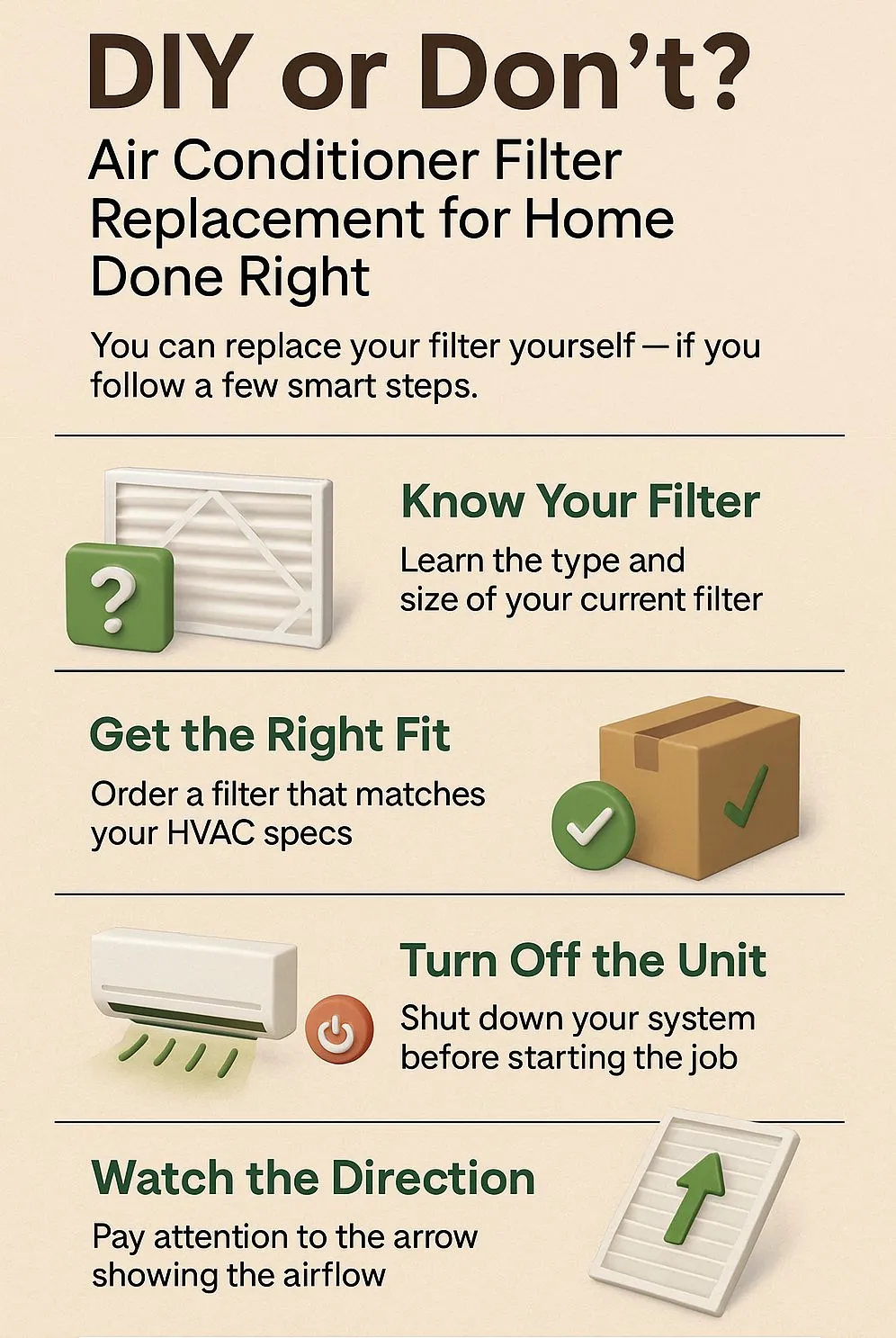Replacing your AC filter might not seem like a high-priority task—but it’s often the hidden cause of rising energy bills, dusty rooms, and HVAC repairs. As HVAC professionals who’ve worked in homes of all sizes and systems, we’ve seen how this small maintenance step makes a massive difference. Whether you’re confident in a DIY approach or unsure if you’re doing it right, this guide will help you handle air conditioner filter replacement for home like a pro.
Key Takeaways
- Changing your AC filter regularly is essential for cleaner air and efficient performance
- Dirty filters cause system strain, poor airflow, and expensive repairs
- Replace filters every 1–3 months, especially if you have pets or allergies
- Choose the right size and MERV rating for your home’s specific needs
- A $15 filter can save you hundreds in HVAC service calls
DIY Made Simple: Your At-Home Filter Replacement Checklist
We’ve serviced homes in all kinds of conditions—from beachside condos to allergy-heavy households—and the same filter-related issues show up again and again. Here's a checklist built from real-world experience that can help you get it right the first time:
- Know your filter type and sizeCheck the frame of your existing filter or HVAC manual. Common types include pleated, fiberglass, or HEPA
- Inspect monthly, replace every 30–90 daysReplace more frequently if you have pets, allergies, or heavy system usage
- Turn off the HVAC system before removing the filterThis ensures safety and prevents unfiltered air from flowing through your system
- Align the airflow arrow properlyAirflow arrows on the filter should point toward the unit’s fan or blower
- Track your replacement dateMark the install date on the filter or log it in your phone calendar to stay consistent
What We’ve Seen: Real Homes, Real Results
Stats That Back the Stories
- The EPA confirms that proper air filtration significantly reduces airborne allergens and indoor pollutants
- Our field experience shows that 30% of summer AC service calls trace back to dirty or clogged filters
Should You DIY or Call a Pro?
Final Thought: The Smallest Fix with the Biggest Impact
We’ve seen firsthand how neglected filters lead to system shutdowns, expensive emergency repairs, and avoidable indoor air issues. But we’ve also seen the power of a simple, consistent filter routine—cleaner air, longer equipment life, and lower energy costs
Changing your filter might not feel urgent, but it’s one of the most valuable habits you can adopt for your home
What to Do Next
- Check your current filter now. Replace if dirty
- Confirm your size and MERV rating before buying a new one
- Set a calendar reminder to check every 30–60 days
- Consider a filter subscription so you never forget again
- Share this checklist with a friend or neighbor—it could save them money too
Frequently Asked Questions (FAQ)
How often should I change my air conditioner filter?
Every 1–3 months. Monthly for homes with pets, dust, or allergies
What happens if I don’t replace the filter?
Your system works harder, consumes more energy, and may break down
How do I choose the right filter?
Match the size on your current filter and choose a MERV rating from 8–13 based on your indoor air quality needs
Is a higher MERV rating better?
Not always. MERV 11–13 filters trap more particles but may restrict airflow in older systems. Check compatibility
What should I include in a filter replacement checklist?
Turn off the system, inspect or remove the old filter, match size and direction, install the new one, and record the date
When it comes to DIY or Don’t? Air Conditioner Filter Replacement for Home Done Right, ensuring your HVAC system operates efficiently often involves more than just swapping out filters. Pairing proper filter replacement with professional upkeep—like the comprehensive services offered through Air Duct Cleaning in Royal Palm Estates—can help maintain optimal airflow and reduce indoor pollutants. For homeowners seeking broader maintenance options, Vent Cleaning Pompano Beach FL provides specialized solutions to prevent dust buildup and improve air quality. Interestingly, cleaner indoor air also ties into overall wellness, echoing principles found in The Importance of Locally Sourced Produce for a Healthy and Sustainable Diet, where fresh, clean inputs directly impact health. Likewise, embracing nature’s benefits through resources like What is an Orchard? Connecting Farm Fresh Produce to Everyday Wellness reinforces the link between environmental quality—both inside and outside your home—and a healthier lifestyle.





